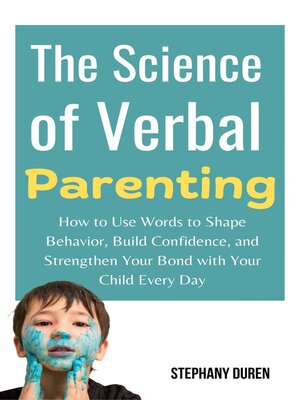The Science of Verbal Parenting
ebook ∣ How to Use Words to Shape Behavior, Build Confidence, and Strengthen Your Bond With Your Child Every Day
By Stephany Duren

Sign up to save your library
With an OverDrive account, you can save your favorite libraries for at-a-glance information about availability. Find out more about OverDrive accounts.
Find this title in Libby, the library reading app by OverDrive.



Search for a digital library with this title
Title found at these libraries:
| Library Name | Distance |
|---|---|
| Loading... |
Every word a parent speaks shapes a child's perception of the world. The way instructions are given, how encouragement is framed, and even the smallest offhanded comments influence confidence, self-discipline, and emotional security. Parents want to raise children who are resilient, self-assured, and emotionally intelligent, but many struggle to find the right words in critical moments. Words can either reinforce a child's strengths or deepen their insecurities, and the difference often comes down to intentional communication.
Verbal parenting is more than giving praise or correcting misbehavior. It's about structuring language in a way that guides a child's development, helping them process emotions, make responsible choices, and build the confidence to navigate life's challenges. The words children hear become the internal dialogue they carry into adulthood. When a child consistently hears language that empowers, reassures, and challenges them in a healthy way, they grow into adults who trust themselves and approach life with confidence.
Many parents fall into common communication traps, speaking in ways that unintentionally foster defiance, anxiety, or self-doubt. When emotions run high, a frustrated parent may react with words that wound rather than teach. A well-intended compliment can reinforce perfectionism instead of effort. A simple instruction, if phrased the wrong way, can trigger resistance instead of cooperation. Without realizing it, parents can shape behaviors that lead to unnecessary struggles at home and beyond.
Effective verbal parenting isn't about saying the perfect thing in every situation—it's about understanding how language influences a child's thought patterns and behaviors. Small shifts in phrasing can turn daily interactions into opportunities for growth. A child who constantly hears "Be careful" may become overly cautious, while a child who hears "Pay attention to what's around you" learns awareness without fear. A child who is told, "You're so smart" may become afraid to fail, but a child who hears, "You worked really hard on that" learns to value persistence over talent.
This book breaks down the science behind language and child development, showing parents how to use words that nurture independence, encourage emotional intelligence, and create a home environment built on trust. Readers will learn how to reframe corrections to encourage cooperation, structure praise to build intrinsic motivation, and respond to emotional outbursts in a way that strengthens the parent-child bond instead of damaging it.
By applying verbal parenting techniques, parents can help children develop self-discipline without relying on threats or rewards. They can foster resilience by changing how they talk about challenges and mistakes. They can reinforce self-worth in ways that don't create dependency on outside validation. These language shifts don't require drastic changes in parenting style—just a deeper awareness of how everyday conversations influence a child's developing mind.
Parents who understand the power of language can turn ordinary moments into lasting lessons. Every meal, bedtime routine, and car ride becomes an opportunity to shape a child's confidence, character, and emotional well-being. When words are used with intention, they do more than correct behavior—they shape a child's entire sense of self. By the time readers finish this book, they will have the tools to communicate in ways that strengthen trust, build resilience, and create an unshakable bond with their child.







